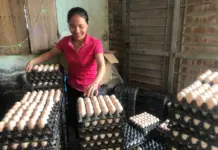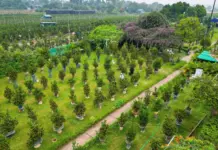The Thai migrated from Yen Bai province to Son La, Dien Bien, and Lai Chau province in the northwest and to Thanh Hoa and Nghe An province in the central region.
In the high mountains, they build houses on stilts to mitigate the harsh weather and avoid wild animals. An old story is that in the past the Thai didn’t know how to build a house. One day a man dreamed of a tortoise, who told him to build a house like its shape. He built a house with a resembling a tortoise shell standing on 4 strong pillars with a balcony encircling the raised living area.
Vuong Thi Min lives in Lai Chau province “Our Thai ancestors lived in ground-level houses which were low and damp. So they started building houses on stilts about 1 meter above the ground. They later they raised the height from 5 steps up to 7 steps and then to 9 steps to protect themselves from wild animals such as elephants.”
The Thai build wood houses without nails. The wood beams and pillars are tied together with bamboo and rattan strips. The ends of the roofs are reinforced with stout logs.
Almost all family activities take place inside the stilt house: a ceremony to welcome a newborn child, a teenage girl learning to weave and embroider, a teenage boy holding a farm tool for the first time. The balcony is where men gather to make fish nets, rattan containers, and other items. Young boys and girls sing and dance in a communal stilt house hoping to find a romantic partner. Ceremonies to worship ancestors, welcome a new bride, or inaugurate a new house take place in the stilt house. Some stilt houses have rooms for as many as 13 couples.
Folklorist Lam Ba Nam said “To talk about Thai culture is to talk about the stilt house. The stilt house is a symbol of the Thai and a cultural space of the Thai. A man is born, grows up, and dies in a stilt house.”
Visitors to Vietnam’s northwestern region never forget the tranquil atmosphere of the Thai community and their big stilt houses standing beside rice fields and life-giving streams.




